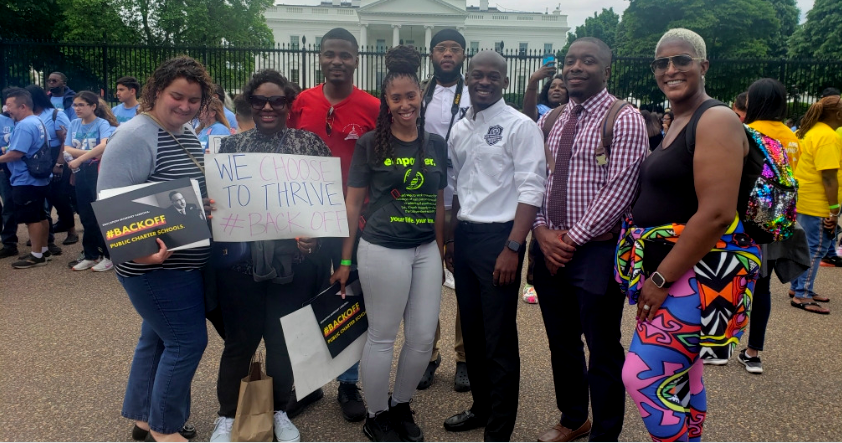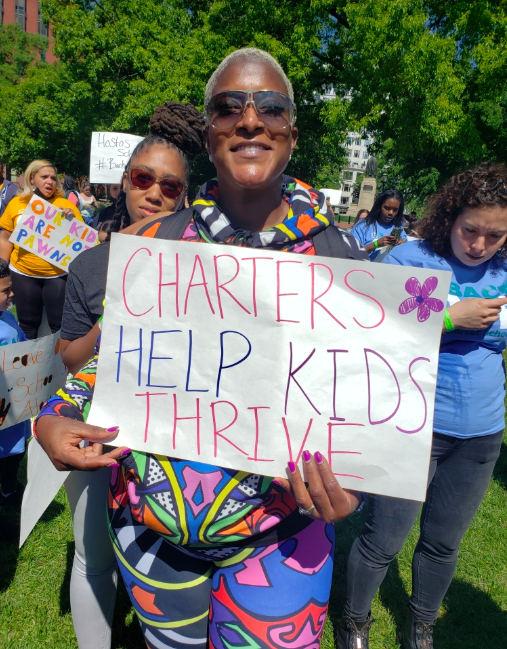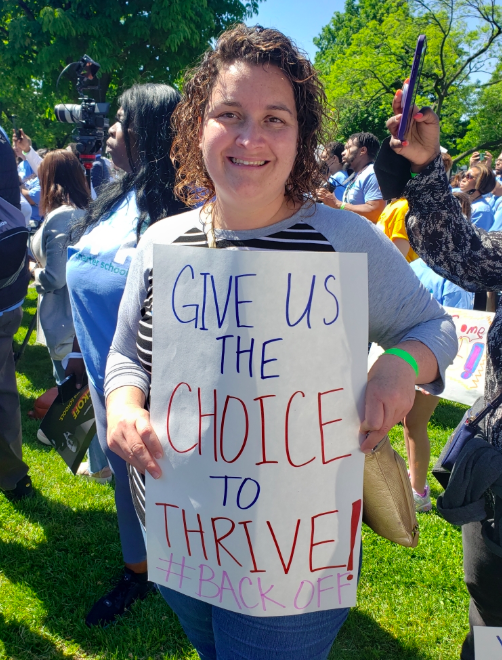 The Georgia Charter Schools Association kicked off National Charter Schools Week from May 8 to 14 by sending several parents to Washington D.C. to speak out against new proposed rules from the U.S. Department of Education.
The Georgia Charter Schools Association kicked off National Charter Schools Week from May 8 to 14 by sending several parents to Washington D.C. to speak out against new proposed rules from the U.S. Department of Education.
On Wednesday, May 11, Georgia parents joined about 1,000 advocates from across the country at a press conference at the U.S. Department of Education, lobbied congressmen on Capitol Hill and rallied across from the White House.
The notice of proposed requirements and selection criteria for the Charter Schools Program grants was published in March. Final rules are expected in the coming months.
The proposed rules would:
- Require a community impact analysis demonstrating that there is “sufficient demand” for the new school and that the project would meet the needs of students and families in the community. But advocates point out that while there are under-enrolled traditional schools, there are still waiting lists for nearby charter schools.
- Encourages charter schools to collaborate with traditional schools, but it is not a requirement.
- Requires that applications to open new charter schools detail how they would create racially and socioeconomically diverse student and staff populations. But, some communities are not racially diverse to start with. The department said these schools would still be eligible for grants.
- The biggest rule is in line with President Joe Biden’s promise to eliminate federal funding to for-profit charter schools. But many non-profit charter schools outsource operations to for-profit companies. Under the proposal, nonprofits could outsource particular tasks — payroll, for instance — to for-profit companies.
“Our proposed priorities [for grants] are aimed at making sure students are delivered the highest quality education in excellent public charter schools,” the agency’s press secretary, Kelly Leon, said.
Nevertheless, advocates say this rule will hurt single-site charter school leaders the most—especially those with culturally affirming practices and schools.
According to Nina Rees, president and chief executive of the National Alliance for Charter Schools, “It adds layers of bureaucracy to an already complicated program, in an effort to discourage individual charter school leaders since they can apply on their own.
“Most single-site schools don’t have the resources to hire expensive grant writers and adding more rules will render the whole thing unworkable. This is ultimately how you kill a program—by demonstrating there is no demand for it.”
Georgia parents said they are afraid the tougher rules will eliminate an option that has helped their children succeed academically.

Charmaine Barnhill, an Atlanta charter school parent, attends a national rally to speak out against newly proposed rules for the federal Charter Schools Program.
“Charters play such a vital role in our children’s lives. So, it was really important for us to show up and show out because we will fight for our schools,” said Charmaine Barnhill, whose two children attend Kindezi West in Atlanta. “Charter schools work for our family because they offer smaller classes, personalized care and attention, and compassionate teachers.”
The week-long celebration recognized the nearly 7,700 public charter schools and campuses across the nation, and 90 charter schools in Florida. National Charter Schools Week exists to celebrate charter schools, the high-quality and tuition-free public schools that nearly 3.6 million students across America and 60,000 around Georgia depend on for an excellent education.
In recognition of the movement’s history and future, this year’s theme was National Charter Schools Week 2022: Charter Schools Rising. “As we celebrate tremendous success in the charter school sector and 60,000 here in Georgia, we are reflecting on our successes and spotlighting the students that will lead us into the next 30 years,” said Tony Roberts, president and CEO of the Georgia Charter Schools Association. “We are humbled by the remarkable work of charter school educators and leaders in an unprecedented year for education.”

Cintia Scanlan, a Savannah charter parent, was one of the Georgia advocates who carried signs and marched on the mall toward the White House.
More than a thousand charter school advocates carried signs and marched on the mall toward the White House. Cintia Scanlan, of Savannah, waved a sign and cheered on speakers who shared personal stories about their children’s experiences at charter schools.
“We tried public school for our three kids, but they weren’t surviving the experience,” said Scanlan, whose children now attend Coastal Empire Montessori Charter School. “Now, they’re not just surviving, our kids are thriving. The teachers are able to meet them where they are; it’s not a one-size-fit-all kind of education. We couldn’t be happier that we have a choice.”
Organizers are asking supporters to:
- Contact Senator Raphael Warnock.
- Use the advocacy website to send a comment letter to the Secretary of Education, Miguel Cardona, saying that you want the proposed regulations rolled back.
- Please consider customizing your comment using the talking points in the toolkit The National Alliance for Public Charter Schools created or sharing how the proposed rules would affect you or your community.
- Share this request with everyone in your network who is willing to fight for charter schools.
The campaign is available for Spanish-speaking families and staff. You can also visit the Spanish page directly. If you speak Spanish, you are encouraged to submit your comments in Spanish to help reflect the diversity of the charter school movement.